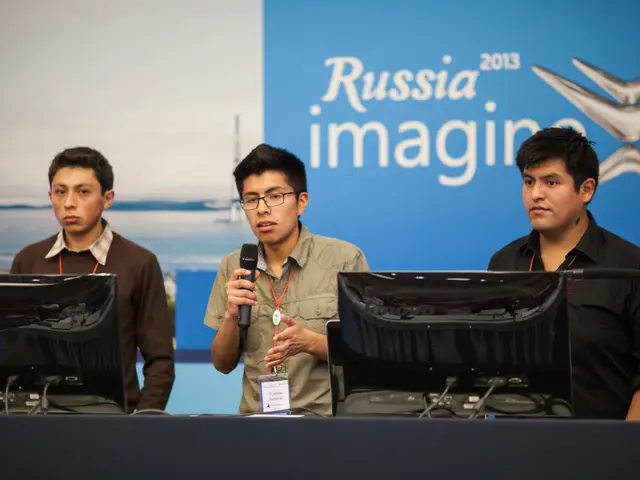Solar Shutdown: Merz Proposes Billions in Gas Discharge - "Reverse"
Germany's energy transition, aiming for climate neutrality by 2045 and a minimum of 80% renewable electricity by 2030, is progressing but faces significant hurdles [1][5]. The government is promoting a large-scale build-up of gas-fired power plants as backup capacity, with plans to auction 20 GW of new gas plants by 2030 [1][2][5]. These plants are intended to complement intermittent wind and solar power and eventually be convertible to run on hydrogen, aligning with the hydrogen strategy updated in 2023.
However, the energy transition is at a critical juncture due to several factors. Renewable output dropped by 16% in 2025, with wind power down 31% due to low wind speeds, increasing reliance on backup fossil fuels [3]. Regulatory and market uncertainties persist, especially regarding the delayed auctions for hydrogen-ready gas plants needed to replace coal with reliable backup [1][3].
Germany continues to face systemic risks from market manipulation investigations and geopolitical challenges related to supply chain dependencies and imported fossil fuels, notably after stopping direct Russian gas imports [3]. Infrastructure expansion is underway, with about 2,200 km of new transmission lines approved and most constructed by early 2025, facilitating integration of renewables [2].
In terms of renewable fuels, Germany is constrained by limited sustainable biomass availability and the high cost/scarcity of green hydrogen and e-fuels. These "green molecules" are critical for sectors that cannot be directly electrified, such as aviation and industry. Projections indicate substantial imports of hydrogen and e-fuels will be needed by 2045 to meet demand, even as domestic production capacity grows [4].
The country's energy transition has made significant strides. In 2024, renewable energies covered 22.4% of gross energy consumption, an increase of 0.8% compared to the previous year [5]. Biomass is the most important renewable source, accounting for about 47% of energy production, while solar energy contributes 16% [5]. In electricity production, the share of renewable energies has almost doubled to 54.4% within ten years [5].
The heating sector covers 18.1% of energy production with renewable energies, while the transport sector lags behind with a 7.2% share of renewable energy production [5]. The Federal Republic is gradually phasing out fossil energy sources.
The energy policy of our country is currently a subject of dispute. The Chancellor, Merz, is planning a multi-billion dollar relief for gas, despite the increasing reliance on renewable energies [6]. Critics view Merz's plan as a step backwards in the energy transition, as the country continues its efforts to reduce its CO2 footprint for years [6].
Environmentally friendly wind and solar energy are gaining importance in the energy production of our country, making it increasingly reliant on environmentally friendly sources [5]. The energy transition in our country is a gradual process, requiring a delicate balance between accelerating renewables and ensuring grid reliability via gas and hydrogen transition pathways.
References:
[1] Deutsche Welle (2023). Germany's energy transition: How the government plans to boost gas-fired power plants. Retrieved from https://www.dw.com/en/germanys-energy-transition-how-the-government-plans-to-boost-gas-fired-power-plants/a-62044801
[2] Bundesnetzagentur (2022). Ausbau von Übertragungsleitungen. Retrieved from https://www.bundesnetzagentur.de/EN/Topics/Electricity/GridExpansion/Ausbau_von_Uebertragungsleitungen/Ausbau_von_Uebertragungsleitungen_node.html
[3] Handelsblatt (2023). Unsicherheiten und Wende in der Energiewende. Retrieved from https://www.handelsblatt.com/politik/deutschland/unsicherheiten-und-wende-in-der-energiewende/27227324.html
[4] Deutsche Welle (2023). Germany's hydrogen strategy: The path to a clean future. Retrieved from https://www.dw.com/en/germanys-hydrogen-strategy-the-path-to-a-clean-future/a-62044812
[5] Federal Statistical Office of Germany (2023). Energy Balances of the Federal Republic of Germany 2022. Retrieved from https://www.destatis.de/DE/Themen/Wirtschaft-Umwelt/Umwelt/Energie/Energiebilanzen/Energiebilanzen_DE,DEU,DEU,01.html
[6] Spiegel Online (2023). Merz plant Milliarden-Gas-Erleichterung. Retrieved from https://www.spiegel.de/politik/deutschland/merz-plant-milliarden-gas-erleichterung-a-7c2684b0-d42d-4e1b-8d6b-22c8420140b9.html
- The finance industry is closely monitoring the energy transition in Germany, as the country's policy-and-legislation regarding renewable-energy plays a significant role in the general-news landscape.
- Concerns about climate-change and the environment are pressing issues for the science community, as the performance of renewable-energy sources, such as wind and solar power, could influence the overall health of our planet.
- The political sphere is grappling with the implications of Germany's energy transition, as leaders debate the merits of promoting renewable-energy versus boosting gas-fired power plants, which may contribute to fossil-fuel dependency.
- The industry sector and aviation face limitations in shifting away from traditional energy sources, as the high cost and scarcity of "green molecules," like green hydrogen and e-fuels, make it challenging to meet the demands of these sectors without fossil fuels.
- Policy-and-legislation concerning renewable-energy production and hydrogen-ready gas plants play a crucial role in facilitating the transition from fossil fuels to renewables, particularly in regards to the future of the energy industry and the environmental-science community.




